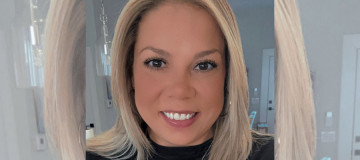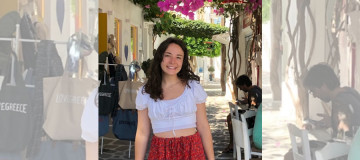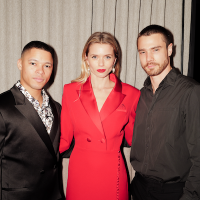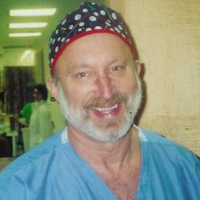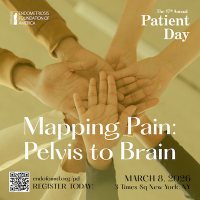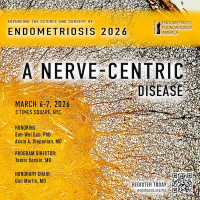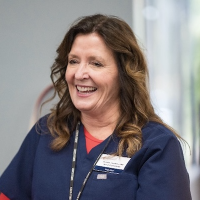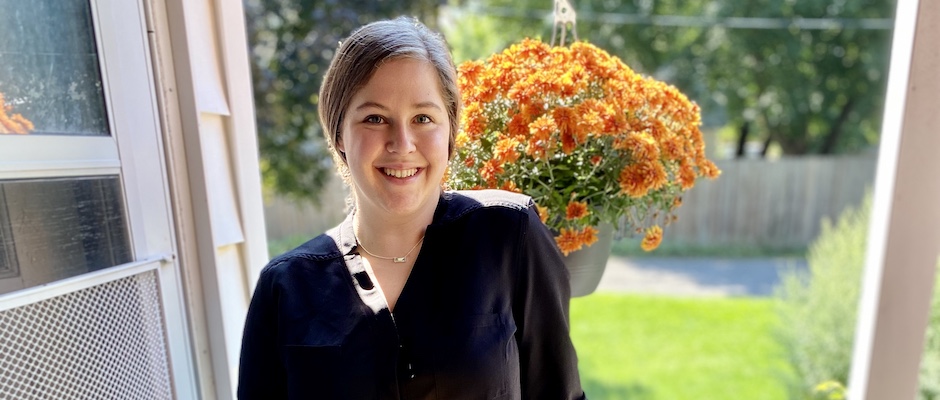
It would be impossible for me to give you the exact number of times I was referred to the emergency room due to severe abdominal pain during my formative teenage years. Every single time, medical professionals would load me up with pain medication, only to then say, “Your CT was actually negative, and you are fine… besides the unexplained pain.” Over the years, ER visits turned into several extended hospitalizations that I often left feeling just as unhealthy and just as confused as before. Countless times I would be admitted to the hospital, diagnosed with illnesses, but doctors could never determine why. At one point, I was diagnosed with gastroparesis and had such low magnesium that I was hooked up to heart monitors and attached to an IV drip of magnesium for five days.
My periods were always very painful and clotty, but I always thought, “This is the way it is.” My doctors never made me feel otherwise, and let’s be honest, most teenage girls don’t feel comfortable enough to even bring painful periods up in the first place. Hell, most adult women don’t feel comfortable having those conversations. There were so many instances of unexplained pain and suffering that it’s almost impossible for me to try to explain them all. And I know many of you reading this know the mental, physical, and emotional pain that undiagnosed endometriosis can cause.
I was well into adulthood and returning to college in upstate New York after a social work department trip to New York City when I experienced a flare up. The weekend included a lot of walking and indulging; I believe overly physically exerting myself often led to many of my large flare ups. I felt indescribable pain and was wildly embarrassed. I was vomiting in front of my colleagues and professors, spread out over two bus seats, clutching my stomach in fetal position. One of my dearest professors wanted to stop the bus and take me to an emergency room, but even in that moment of mind numbing pain, I remember thinking, “Something is wrong, but they won’t find anything… we should just get home.” The bus finally parked on campus hours later, and my best friend drove me straight to the ER, only to wait eight hours for the doctors to tell me, “She needs a gynecology referral, there’s nothing we can do here.”
After that last ER visit, my supportive parents asked me to come back home so we could finally try and get to the bottom of what was causing me so much pain. I first saw my local gynecologist, who told me about endometriosis for the first time. I was 21 years old. It was not fully explained to me; there was no discussion of any possible treatment options or patient education on the matter. I was just booked for surgery two days later for an exploratory laparoscopy and possible endometriosis ablation. Not knowing enough to ask questions, I placed my trust in this doctor who might be able to help me understand what I was experiencing. I woke up and was told they did not find endometriosis, just some adhesions, and was told, you just have bad periods, but definitely not endometriosis. I was wrecked at this point and truly was starting to believe that this was all in my head. I wanted answers and nobody could find them for me.
By 2017, I’d just started a new job at a school, and I was once again paralyzed by pain. My gynecologist sent me to the ER after finding fluid in my ultrasound. This time, my doctors thought it was definitely appendicitis. My heart rate was considered tachycardia because of the immense pain I was in. I was scanned, and no appendicitis. They said that maybe a cyst had ruptured, and that was why I had fluid. I was discharged and told to see a gynecologist, even though it was a gynecologist who referred me.
I sucked it up and went to work the next morning, just like all of us have done before. I made it through the day and went straight to the doctor’s office again, where I was told I had pelvic floor dysfunction and was referred to physical therapy. I went to work again the next day, still in immense pain, but had no choice but to push through it all. The whole week is pretty much a blur to me now, but I remember crying in the staff bathroom, texting my mom, “There has to be something they are missing.” She said, “I know baby,” like she had so many times before.
I went straight to the ER that day after work where I begged for them to open me up because I knew something was wrong. Thankfully, the surgeon, although hesitant, agreed. My parents said that when the surgeon came to speak with them, he was visibly shaky and stated I did in fact have appendicitis; shaky, because he also noticed my appendix was covered with dark spots that he had never seen before. As a general surgeon, he did not think to biopsy past benign/malignant, so I still did not know that endometriosis was a possibility. If in that moment the surgeon had been trained to test for endometriosis through pathology, I would have had answers and finally been validated. I fully believe that EndoFound’s educational resources can help change that, not only for patients, but for health care providers as well. I could have potentially received my endometriosis diagnosis at that time, and I wouldn’t have been so confused when my pain only continued to get worse over the coming months.
After that encounter, I started to trust my body. I advocated for myself and got help when the pain and symptoms were still there, and when they became even worse than before the appendectomy. Endometriosis kept coming up in my frequent online searches, but I thought to myself, “There’s no way… they already told me there was no chance of this.” I became an established patient with a new gynecologist who was fantastic; he openly admitted that he was not a specialist and did not feel comfortable performing diagnostic surgery, as he couldn’t guarantee he would be able to see it all. He presumptively diagnosed me and recommended Lupron. However, further research of this drug left me very scared and questionable of its use. My parents sat me down and said, “We need to get you to a specialist.” I needed to start taking better action. I Google-searched, “dark benign spots on appendix.” This eventually led me to EndoFound.
After finding EndoFound’s website, I read about every single thing I had been feeling for years in the patient testimonials and informational section. I finally found an excision specialist after much research through EndoFound. I had to travel five hours to see the specialist, but it was worth it to have a chance at having my life back. As most of you know, this does not come cheap, as insurance rarely covers the majority of this procedure and the nearest surgeon was five hours away. I am eternally grateful to my parents for helping make this happen for me.
I had my excision surgery on 8/9/2019, and it was finally confirmed that I had endometriosis and significant adhesions. I woke up from my surgery anesthetized, in tears, repeating, “I wasn’t crazy.” That feeling of validation I had been seeking for so many years had finally come to fruition, and it would not have been made possible without having found the EndoFound website. I finally, with EndoFound’s help, had validation to receive gold standard treatment that ideally should be accessible to all that are in need. I remember vowing to myself the second day in the hospital after my surgery, that I would find a way to give back to the people who empowered me to get help.
A little over one year post-surgical excision, I am now 27 years old, and I have an immensely better quality of life. I am not frequenting the ER for pain management, I am able to exercise, socialize, and enjoy life. I do not have to worry about the constant balance of using and budgeting my sick days for “flares worse than this one” and suffering through work with cellulitis and bronchitis, as I had to before. Do not get me wrong, surgery was not a cure; as you all know, a cure does not exist, but my good days are far outweighing my bad, and it is a blessing to have this new lease on life. EndoFound also was able to lead me to find different ways to manage my disease post-surgery. They recommended the top care, and it led to the best results I could have ever asked for. Now that I am in a much healthier place, I wanted to focus on giving back to EndoFound.
A friend introduced me to a charitable wine company out of Napa Valley called “One Hope,” that I have become a Cause Entrepreneur for. They have raised over $5.5 Million to date, and given back to causes all across the US. This friend was a teacher of mine in high school, who saw my struggles, lack of attendance, and hospitalizations. She knew I had a strong reason for wanting to join a company that gives 10% back to causes close to home. I have also committed myself to donate 10% of all of my sales for the year to go back to EndoFound. Being an endometriosis patient, I know alcohol can be a trigger for symptoms. Personally, I can’t drink alcohol on certain days of the month. I also recognized how impactful it would be to fundraise for EndoFound as my nonprofit of choice for gifting purposes and family members of those with endometriosis who want to support advocacy and empowerment for those suffering.
My purpose is giving back to EndoFound, an organization that works to increase disease recognition, provide advocacy, facilitate expert surgical training, fund landmark endometriosis research, but most importantly, change lives, like they have mine. I encourage you all to purchase some charitable and delicious wine, with proceeds going back to the nonprofit that led me to a diagnosis and better quality of life. This event will stay open through the holiday season to meet all of your gifting and hosting needs.
Join Leslie's fundraiser for endometriosis support on OneHope Wine.
Leslie Patriarco is a 27 year old female living in Cortland, NY. She is a Licensed Master of Social work (LMSW) working towards her LCSW with a passion towards mental health and social justice. She loves her family, friends, and goldendoodles dearly. She has a personal journey with endometriosis and after finding EndoFound as a resource hub that lead her to treatment she has decided the importance of giving back outside of her mental health professional role and began a side business as a Cause Entrepreneur for OneHope Wine to bridge her passion for wine and charity—her charity of choice being EndoFound.
Editor's note: Would you like to contribute to EndoStories? Click here to learn how to submit your work.
*Patient stories submitted to EndoFound.org are the views of the patient and not necessarily those of the foundation. All testimonials are from real patients, and may not reflect the typical patient’s experience, and are not intended to represent or guarantee that anyone will achieve the same or similar results.



